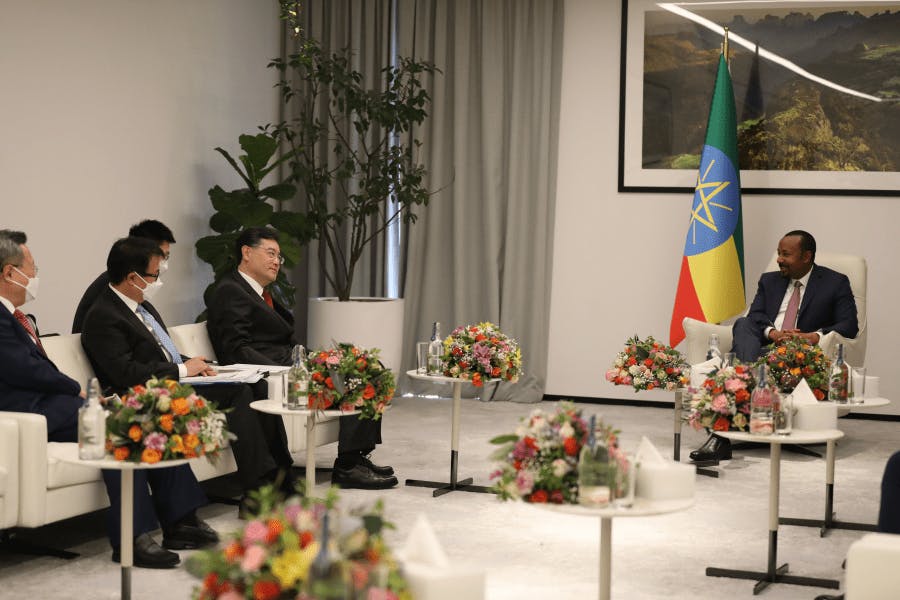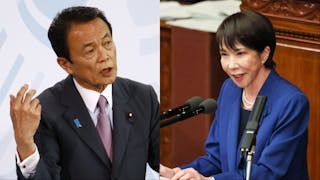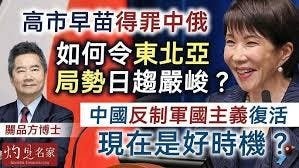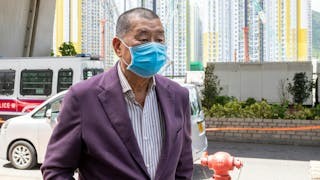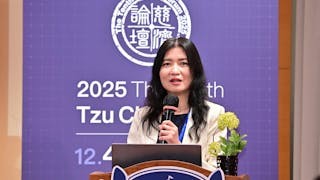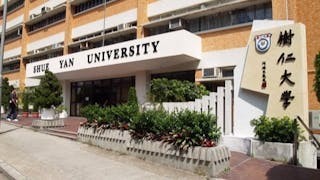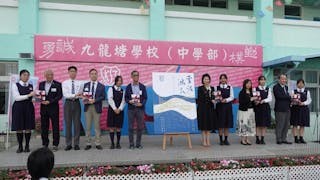從中國新任外交部長秦剛最近訪問非洲及其相關講話來看,中國一直在採取以滿足盡可能多非洲國家的基本需求的外交政策。
1月10日,秦剛在訪問埃塞俄比亞時表示,埃塞俄比亞政府與提格雷人民解放陣線達成停火協議,是埃塞和平與發展進入新階段的好兆頭。秦剛強調,提格雷地區的衝突是埃塞俄比亞的內政,中國一向尊重埃塞俄比亞的主權和領土完整,尊重非洲人以非洲方式解決問題。
秦剛重申對非外交優先
秦剛說,中國提出了非洲之角和平發展構想,支持召開和平會議以實現和平。此外,中國將繼續為埃塞俄比亞特別是衝突地區提供食品、疫苗和人道主義物資。
同日,秦剛會見了埃塞俄比亞副總理兼外長德梅克。秦剛說,中國為埃塞俄比亞克服克服挑戰實現經濟社會發展提供了至關重要的幫助,兩國是全面戰略合作夥伴。此外,中國還幫助埃塞完成了亞吉鐵路、亞的斯輕軌、河岸綠色發展、非洲領導力學院等一大批重點合作項目。
1月11日,秦剛在第八次中非戰略對話期間會見非盟委員會主席法基。秦剛表示,非盟為非洲發展中國家指明了發展、合作與團結的步伐。 他指出,非洲一體化勢頭強勁,非洲在國際事務中的集體影響力日益增強。這位外交部長說,中國始終將非洲置於外交優先方向,傳承和弘揚中非友誼已經成為中國外交的光榮傳統和鮮明底色。秦剛說,中國一直支持非盟加入二十國集團,支持非洲在聯合國安理會擁有更多發言權。
回應秦剛的發言,法基表示,在非洲爭取民族獨立和解放的斗爭中,中國同非洲站在一起;在非洲加快發展振興、更多參與國際事務的努力中,中國同非洲站在一起。 法基對中方支持非洲一體化進程和自貿區建設表示讚賞。雙方同意密切高層往來,更緊密對接各自發展戰略,聚焦疾控等務實合作。
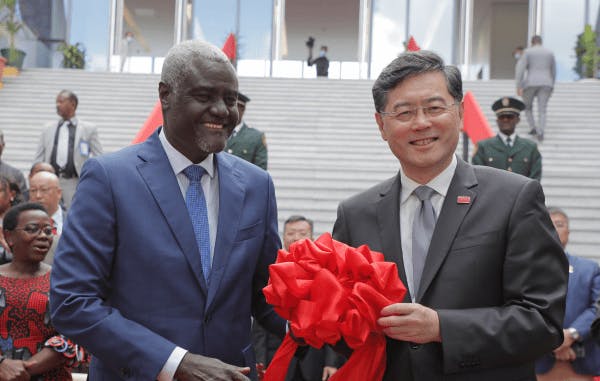
中非關係發展四倡議
秦剛就推動中非關係發展提出四點建議。一是加快推進中非實體交往和理念相通。中方將繼續踐行真實親誠理念和正確義利觀,同非方擴大各領域、各層級交流合作,支持南非當好金磚國家輪值主席國,支持烏干達辦好不結盟國家首腦會議。
二是不斷深化中非盟友好關係。以中國式現代化為非洲提供新機遇,繼續支持非盟引領非洲國家走符合自身國情的發展道路。換句話說,如果說中國有自己的現代化風格,那麼非洲也一樣。
三是大力推動中非合作提質升級。加快落實中非合作論壇第8屆部長會(2021年12月舉行)成果,繼續擴大對非貿易,推動中非投資合作高質量發展,拓展衛生健康、綠色發展、數字經濟等領域新動能,為非洲經濟社會發展提供更多支持。
四是堅定捍衛發展中國家團結合作。堅持自信自強自立,堅守全人類共同價值,反對霸權、霸淩、霸道和種族歧視行徑,共同維護真正的多邊主義,促進國際關係民主化,增強發展中國家特別是非洲國家在聯合國安理會等國際組織中的代表性和發言權。
與此同時,秦剛在與非盟委員會主席法基舉行的新聞發布會上強調,中國不會在非洲製造任何「債務陷阱」。秦剛觀察到,資金不足成為制約非洲繁榮振興的主要瓶頸,挑戰在於如何平衡所有發展中國家的發展融資與債務增長。 他指出,中國積極參與G20共同框架下對乍得、埃塞俄比亞和贊比亞個案債務處理,從國際貨幣基金組織增發給中國的特別提款權中拿出100億美元,轉借給非洲國家。具體而言,中國呼籲有關各方採取共同行動、公平分擔的原則,減輕非洲的債務負擔。
1月11日,秦剛強調,中美兩國同為聯合國安理會常任理事國,對世界和平、安全與發展都肩負着重大責任。此外,中美關係不應該是競爭關係,更不是以犧牲對方為代價擴大自身利益的零和博弈。 相反,秦剛呼籲中美相互合作,相互尊重,和平共處,追求雙贏。
秦強調,中國在非洲建設了大量基建設施項目,包括6000公里鐵路、6000公里公路、20個港口、80個電力設施、130所醫院和診所、170所學校、45個體育場館和500個農業項目。這些成果實實在在,可以幫助非洲國家改善經濟社會發展和民生。

出訪證中國與殖民列強不同
儘管有評論將秦剛之行非洲之行視為抗衡2022年12月13日至15日在華盛頓舉行的美非領導人峰會的舉措,但他的非洲之行可以從更積極的角度解讀。
首先,秦剛強調中美關係雙贏合作的言論,似乎是在呼籲美國作為世界大國,應該幫助非洲國家發展,而不是相互較量。
其次,秦剛強調需要滿足非洲的基本需求,如公共衛生、食品供應、疫苗、人道主義援助、學校和基礎設施項目,這意味着中國一直在採取基本需求外交政策。畢竟,如何改善非洲基層民生,正是中國從50年代到90年代面臨的基本問題。中國在2000年代的崛起產生了中國式現代化,這可能適合也可能不適合不同的非洲國家,而秦剛呼籲非洲國家發展適合本國國情的現代化建設方式。
第三,秦剛的非洲之行表明,習近平主席領導下的中國採用了三個世界理論,第一世界現在由美俄等超級大國組成,而中國是新興大國; 第二世界包括西方發達國家; 第三世界仍然由非洲的許多發展中國家組成。 因此,秦剛對非洲的訪問證明,中國仍然懷着幫助非洲國家克服不發達狀態的想法。
第四,中國願意幫助和推動非洲參與國際組織,從而提高非洲的整體地位。中國的這次外交證明,習近平治下的中國追求的是「人類命運共同體」,即國家與國家最終會達至理想的平等,從而改變三個世界,或許是一個和平、平等、發展的世界,在所有國家實現在一個理想的情景中──也許是一種新的社會主義願景,但被一些經常將中國的崛起視為「威脅」的人所忽視。
第五,中國不同於帝國主義時代剝削非洲的殖民列強。相反,中國急於避免非洲國家在經濟快速發展過程欠債。 與此同時,中國正在向非洲國家灌輸更強的多邊主義和反霸主義意識,這些國家過去大多經歷過帝國主義的衝擊,就像清朝統治下的中國一樣。
總之,秦剛此次非洲之行具有重要的外交和政治意義。這標誌着中國通過提供基本需求的外交來幫助非洲國家的社會經濟和可持續發展。這證明中國渴望與美國和平共處,為非洲國家的現代化做出貢獻,而不是進行任何零和競爭。這也體現了毛澤東三個世界理論在習近平時代對中國的影響,修正了三個世界理論,但保留了非洲國家作為發展中的第三世界。秦剛此行見證了中國在支持多邊主義和世界進程中同非洲分享發展經驗,助力非洲提升國際地位,克服經濟社會不發達局面,實現和平共贏的決心──這種新的社會主義世界觀,被許多中國外交政策和基本需求外交的觀察家所忽視。
China’s Basic Needs Diplomacy in Africa and Its Implications
Judging from the recent visits of the new Chinese Foreign Minister, Qin Gang, to Africa and his related speeches, the People’s Republic of China (PRC) has been launching a diplomacy of meeting the basic needs of as many African states as possible.
On January 10, 2023, when Qin Gang visited Ethiopia, he expressed his view that the ceasefire agreement reached between the federal government of Ethiopia and the Tigray People’s Liberation Front was a good sign pointing to a new stage of peace and development in the country. Qin stressed that the conflicts in the Tigray region was Ethiopia’s internal affairs as China has often respected its sovereignty, territorial integrity and how Africans solve their problems in African ways.
Qin said that China put forward a document on the outlook for peace and development in the horn of Africa, and that it supports the holding of peace conference to bring about peace. Moreover, China will continue to provide food, vaccines, and humanitarian supplies for Ethiopia, especially in the conflict-ridden areas.
On the same day, Qin Gang met Ethiopian Deputy Prime Minister and Foreign Minister Demeke Hassen. Qin added that China has been providing aid for Ethiopia to overcome socio-economic problems, and that both countries have comprehensive strategic cooperation. Furthermore, China has helped Ethiopia to complete some infrastructure projects, such as the Addis Ababa-Djibouti Railway, the Addis Ababa Light Rail, and the Addis Ababa Riverside Green Development and leadership schools.
On January 11, Qin Gang met African Union (AU) Commission chair Moussa Faki Mahamat during the 8th China-African Union Strategic Dialogue. Qin commented that the AU set the pace of development, cooperation and solidarity for the developing states in Africa. He pointed to the strong momentum of African integration and the increasing collective influence of Africa on international affairs. The Chinese foreign minister added that China has often prioritized Africa in its diplomacy and inherit the tradition of Sino-African friendship. Qin said China has been supporting the entry of African Union into the G20 and Africa’s greater representation at the United Nations Security Council.
In response to Qin’s remarks, Faki said that China had supported Africa’s struggle for national independence, liberation, development and participation in international affairs. Faki expressed his appreciation for China’s support of Africa’s integration and its development of free trade areas. The two sides agreed to increase high-level exchanges, align their cooperative areas and focus on practical collaboration, including disease control and prevention.
Qin put forward a four-point proposal in promoting the development of Sino-African relations. First, human interactions and connectivity of ideas will have to be intensified between China and Africa. China will follow the principles of sincerity, concrete results, amity and good faith in pursuing common and shared interests to enhance cooperation with African at all levels. China supports South Africa in rotating the chair position of BRICS and it also supports Uganda in hosting the Summit Conference of the Heads of State or Governments of the Non-Aligned Movement.
Second, in the process of deepening Sino-African relations, China is going to provide more opportunities for Africa with the Chinese experiences of modernization and to support the AU in leading African states in the path of development suitable for their national circumstances. In other words, if China has its own style of modernization, Africa is the same.
Third, to elevate the level of Sino-African cooperation, the two sides should speed up the achievement of the outcomes of the Forum on China-African Cooperation (FOCAC) Ministerial Conference (which was held in December 2021), expand trade volumes, promote Sino-African financing and investment cooperation, and boost development in the areas of health, digital economy and sustainability.
Fourth, both China and African should reinforce their confidence, strength, self-reliance, common values, anti-hegemonism, anti-racial discrimination, and the values of multilateralism and greater democracy in international relations. African voice in the UN Security Council and other international organizations should be enhanced.
At the same time, Qin Gang emphasized that China is not creating any “debt trap” in African during a press conference with the African Union Commission chair Moussa Faki Mahamat. Qin observed that the lack of funds has become a major obstacle to Africa’s prosperity, and that the challenge is how to balance development financing with debt growth in all developing countries. He pointed to China’s case-by-case treatment for Chad, Ethiopia and Zambia under the G20 common framework, and China would channel to African states US$ 10 billion from its share of the International Monetary Fund’s new allocation of Special Drawing Rights. Specifically, the PRC has called on all parties concerned to alleviate the debt burden of Africa by adopting the principle of common actions and fair burden-sharing.
Finally, on January 11, Qin Gang stressed that, as permanent members of the UN Security Council, both China and the US should shoulder the responsibility of maintaining world peace, security and development. Moreover, the Sino-US relations should not be about a competitive one or a zero-sum game that enlarges one’s own gains at the expense of another. Instead, Qin appealed to China and US to cooperate with each other, respect each other, coexist in peace and pursue a win-win situation.
Qin emphasized that China has built a lot of infrastructure projects in Africa, including 6,000 kilometers of railways, 6,000 kilometers of roads, 20 ports, 80 power facilities, 130 hospitals and clinics, 170 schools 45 sports venues and 500 agricultural projects. These outcomes are tangible and can help African states to improve socio-economic development and the people’s livelihood.
Although some commentators have seen Qin Gang’s visit to Africa as a move to counterbalance the US-African Leaders Summit held in Washington from December 13 to 15, 2022, his trip to African can be interpreted in a more positive way.
First, Qin Gang’s remarks that emphasize a win-win situation and cooperation in Sino-US relations appear to appeal to the US that, as big countries in the world, both powers should assist the development of African states rather than engaging in mutual rivalries.
Second, Qin’s emphasis on the need to meet the basic needs of Africa, such as public health, food supply, vaccines, humanitarian aid, schools and infrastructure projects, means that China has been adopting the basic needs diplomacy. After all, how to improve the people’s livelihood of Africans at the grassroots level was exactly the basic problem faced by China from the 1950s to the 1990s. The rise of China in the 2000s has produced a Chinese-style of modernization, which may or may not be suitable for different African states. But Qin Gang appeals to African states to develop their own style of modernization suitable to their national situation.
Third, Qin’s visit to African showed that China under President Xi Jinping adopts the theory of the three worlds in which the first world is now composed of superpowers like the US and Russia, while China is an emergent power; the second world comprises the Western developed states; and the third world is still composed of many developing states in Africa. As such, Qin’s visit to Africa proves that China is still cherishing to help African states to overcome underdevelopment.
Fourth, China is keen to assist and boost Africa’s participation in international organization so that the status of Africa as a whole can and will be elevated. This diplomacy on the part of the PRC proves that China under Xi Jinping is pursuing a “common destiny for the mankind” in which states would be ideally and eventually be equal, thereby changing the three worlds to perhaps a world with peace, equality and development among all states in an ideal scenario – perhaps a new socialist vision that has been neglected by some people who often view the rise of China as a “threat.”
Fifth, China is different from those colonial powers that exploited Africa in the era of imperialism. Instead, China is eager to avoid the debts incurred to African states in the process of rapid economic development. At the same time, China is instilling a greater sense of multilateralism and anti-hegemonism among the psyche of African states, most of which experienced the onslaught of imperialism in the past, as with China under the Qing dynasty.
In conclusion, Qin Gang’s recent visit to Africa is diplomatically and politically significant. It signals China’s adoption of the basic needs diplomacy to assist the socio-economic and sustainable development of African states. It proves that China is keen to coexist with the US peacefully in the realm of contributing to the modernization of African states rather than engaging in any zero-sum rivalry. It also demonstrates the legacy of Mao Zedong’s three worlds theory in China under the Xi Jinping era during which the three worlds have been revised but retained the African states as the developing third world. Qin Gang’s trip is a testimony to China’s determination to share its developmental experiences with Africa, to help elevating its international status, to overcome underdevelopment in the socio-economic spheres, and to achieve a win-win situation in the process of supporting multilateralism and world peace – a new socialist worldview that has been neglected by many observers of China’s foreign policy and basic needs diplomacy.
原刊於澳門新聞通訊社(MNA)網站,本社獲作者授權轉載。網址:https://www.macaubusiness.com/opinion-chinas-basic-needs-diplomacy-in-africa-and-its-implications/



